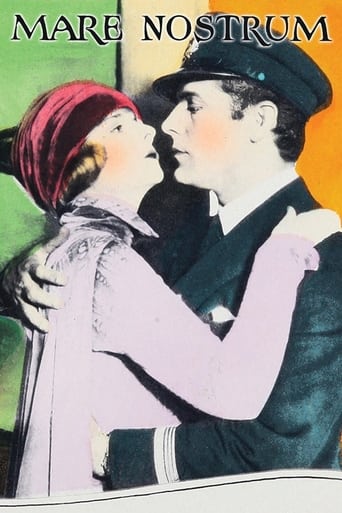

"Mare Nostrum" is the sort of film that must have played very well back in the day but now looks very, very dated. This is because the plot is often ridiculously melodramatic and very old fashioned. It also includes some story elements (such as the Greek goddess Amphitrite) that just seem out of place and unnecessary.The movie begins with a prologue that is completely unnecessary, so I will say no more. The next scene finds the young boy at the beginning is grown and is a sea captain--much to his wife's dismay. In fact, she harangues him about this and he vows to quit. However, WWI erupts and the man realizes he can make a fortune with his shipping business. However, what he doesn't know is that his trip from home in Barcelona to Italy will result in ruin, as he meets a beautiful temptress who seduces him. In fact, she even gets him to do a small mission for the Germans, as she's actually a spy for the Central Powers. Captain Ulysses has been assured that his helping supply a submarine with fuel won't be a problem, as the ship won't attack any passenger ships. But, soon the u-boat IS attacking cruise ships and sinks the one with Ulysses' son aboard! Now, Ulysses is furious and vows revenge against the female spy and her cause. What's next? See the film.In many ways, this film plays like a much more melodramatic version of "Mata Hari". It also features characters that are pretty unlikable and a running theme about a Greek goddess that comes off as very heavy-handed. Although also heavy-handed, I did like the Angel of Death clip near the end--it was pretty funny. Overall, a watchable film that is probably best seen by folks who adore silents and will cut the film a lot of slack, as it is pretty silly.
... View MoreMare Nostrum (1926) *** (out of 4) Lavish MGM production takes a rather routine screenplay and turns it into something rather unique. Seaman Ulysses Ferragut (Antonio Moreno) falls for a woman (Alice Terry) who turns out to be a German spy and their relationship leads to one disaster after another. That's pretty much all you need to know in terms of story because there's no question that the main reason to check this out is the visual style. Even though the story is pretty routine, director Ingram at least pumps plenty of style and gives us some terrific visuals along the way. The film has our Captain being fixated on the sea goddess Amphitrite and this is the reason he ends up falling for the spy as the two look quite a bit alike. This obsession was one of the most interesting things about the screenplay and I must admit that I was pulled in by the "old ways" involving the mysterious of the sea and the various folk tales that are brought into the film. One of the best moments happens at the very start of the film when we see some items at the bottom of the sea. This certainly isn't anything we haven't seen in earlier films but Ingram shows it in such a striking way that it's very memorable. The same is true of the ending, which I won't ruin but there's no question the image is perfectly filmed. Some of the stuff goes a tad bit too far into melodrama including the relationship between the Captain and his wife. There's also a German officer that's a tad bit too silly and it's made even worse by the fact that it's played by an Erich von Stroheim look-alike. I'm sure had Erich been on good terms with the studio then he would have been playing the part. I do wonder why the studio and director cast someone like they did as I'm sure folks in 1926 saw the resemblance. As far as the performances go Terry clearly steals the film. She's extremely passionate, sexual and dramatic so she perfectly captures whatever it is she needs to do. I thought she really brought her character to life and managed to easily steal the film. Moreno is pretty much forgotten today but at the time he was Valentino's rival. His looks probably brought the majority of the women to the film but he turned in a nice performance. There's no question that the screenplay isn't the greatest but the cast and especially Ingram make this something a lot better than it would have been in lesser hands.
... View MoreHandsome seaman Antonio Moreno (as Ulysses Ferragut) grows up enthralled by the legendary goddess "Amphitrite". The bewitching blonde is described as "the mother and sweetheart of all Mediterranean sailors," and Mr. Moreno keeps a portrait of her in his Barcelona home. There, Moreno lives comfortably with dark-haired wife Kithnou (as Cinta) and their beloved son Michael Brantford (as Esteban). Moreno captains his freighter ship "Mare Nostrum" (Latin for "Our Sea") along the Mediterranean while his wife worries about their son's frequently absent father...To be a better father, Moreno decides to give up the lovely "Amphitrite" illusion and his seafaring to spend more time at home. This would leave the "Mare Nostrum" in the hands of Frederic Mariotti (as Toni) and obese Christian cook Hughie Mack (as Caragol). But, two things alter Moreno's plans. First, the Great War (aka World War I) begins, making his shipping business more lucrative and important. Then, Moreno meets alluring Alice Terry (as Freya Talberg), who appears to be the sea goddess "Amphitrite" come to life. Alas, Ms. Terry is no goddess, she's spy for Germany! Continuing to strive for art, director Rex Ingram slowed down his dramatic pace and vowed to film exclusively outside of Hollywood for "Mare Nostrum". It had all the ingredients of a blockbuster - successful director (Ingram), handsome star (Moreno), proved source material (Ibanez), and popular female (Terry) - all done at a healthy budget for MGM distribution. Trouble is, the film simply does not deliver the anticipated excitement. While it seems to presently be lacking its original soundtrack, the surviving print is great condition. It's beautifully shot in France, Italy and Spain.****** Mare Nostrum (2/15/26) Rex Ingram ~ Antonio Moreno, Alice Terry, Hughie Mack, Mickey Brantford
... View MoreA young Spanish sea captain learns about life & death, great love & passionate hatred, while sailing the waters of MARE NOSTRUM - Our Sea.'Brilliant & disturbing, this was the last important film from acclaimed silent director Rex Ingram. Produced to great effect on location in the Western Mediterranean, this was one of Metro's biggest films of the 1920's. Returning to the author who had already given him enormous success with THE FOUR HORSEMEN OF THE APOCALYPSE - Vicente Blasco Ibáñez - Ingram would once again produce a film of exceptional high quality. Today, it is all but forgotten...Antonio Moreno gives a vivid performance as the Captain who is used so harshly by fate. His doleful eyes linger in the imagination of the viewer long after the end of the film. Alice Terry - Mrs. Rex Ingram - is sultry & beautiful as the Austrian spy who seduces Moreno. Her firing squad scene is considered a classic of pacing & composition, and she is magnificent in it.Uni Apollon is very effective in his few minutes as an old Spanish sea dog. Madame Pâquerette, as a large, mannish German spy master is formidable. Hughie Mack, as an absolutely loyal, grossly obese Spanish servant, is especially satisfying. (This excellent character actor would die from heart disease the year after MARE NOSTRUM's release, at the age of only 42.)The unfortunate use of obvious models for some of the scenes at sea is more than mitigated by the presence of real ships & submarines in others. The filming among the ruins in Italy's Pompeii & Paestum, as well as the spy chase along the waterfront in Marseille, add tremendously to the overall ambiance of this remarkable film.The underwater sequences with Amphitrite, goddess of Mare Nostrum, are absolutely haunting.
... View More